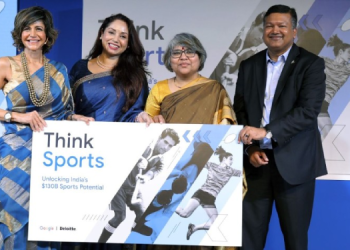The Indian online gaming market is on a strong growth trajectory and the total gaming market in India is projected to grow at 113% from Rs 136 billion ($1.83 billion) in 2021 to Rs 290 billion ($3.91 billion) in 2025, according to KPMG report. The report further stated that online casual gaming has emerged as a major channel both in terms of the game base at 420 Mn in FY21, and the revenue contribution to the gaming industry at Rs 60 bn (of the total gaming industry size of Rs 136 bn in FY21).
The growth factors are attributed to technology infrastructure development which is made available through high-speed internet and affordable data pack prices. The growth of digital payments, whose growth was bolstered by demonetisation and the Indian government’s focus on Unified Payments Interface (UPI) is another contributing factor to the growth of the gaming industry in the country, according to KPMG report.
The Indian fantasy sports industry has contributed Rs 3000 Cr in FY 20-21 to the sports ecosystem in India, through a multitude of avenues like sponsoring sports teams, leagues, players buying rights, and even supporting the development of sports at a grassroots level. This number is expected to double in the next three years alongside the growth of the industry and its participating user base. Niti Aayog in a recommendation paper launched in Dec 2020, has already pegged India as an ideal candidate to become a global hub for the fast-growing industry of fantasy sports. Additionally, PwC in its report has stated that the online fantasy sports sector in India is expected to be worth $3.7 billion by 2024.
Driving factors for the growth of Gaming & Esports in 2022
The gaming industry witnessed a rapid growth in supply and the quality of games, where consumers are provided high quality global and Indian game titles, so what would be the driving factors for the growth of Gaming & Esports in 2022?
“Games and gaming content are highly engaging and we’re seeing a huge spike in average and concurrent viewership for gaming content. The consumers are very dynamic and their attention span size has decreased noticeably in GenZ. We see short gaming video content to witness a never seen before hype in the gaming community,” observes Tarun Gupta, Founder, Ultimate Battle, online esports platform.
According to Gupta, the mobile gaming market is expanding in tier 2 and tier 3 cities and we’ll witness a rise in engagement in games, viewership, and content creation. Young gamers will play engaging games, consume fast-paced engaging content, and want to socialize with gamers often simultaneously.
“The reason why online gaming is popular can be said typically due to its on-demand, real-time gameplay nature and with the COVID-19 limiting our physical movement, it has turned into a great source of social engagement and a means of recreation recently, ultimately fueling the rise of the online gaming industry,” said Abhishek Aggarwal, Co-Founder & CEO, Trinity Gaming.
The year 2022 expects an increase in popularity of the esports segment as we are already witnessing the growth in the participation of Indian youth towards it. Constant technological advancements will surely play a key role and the introduction of 5G would be a great accelerator to promote and support the esports ecosystem giving the professional players and creators more power to control.
“Over a short period of time, the esports industry has secured interest and recognition among the venture capitalists that are showing sincere interest in investing massive amounts in this new industry. They are open to understanding the growth and strengths of this sector in the Indian market and its potentials are attracting them. Lastly, the gamers and the content creators in this particular segment enjoy a loyal fan base and with constant new developments, the fan base is only expected to grow,” added Aggarwal.
All these factors will lead to more virtual world socialization among the young generation and higher consumption of gaming content.
Effective marketing strategies
As such, 2022 will usher higher inclination by brands into the gaming industry to target the young age group of 18 to 25.
Commenting on the marketing strategies of the gaming industry in 20222, Aggarwal said, “Gaming Influencers collaborating with top brands is the most effective strategy with regards to the online gaming industry. Brands that are industry-specific like ASUS, HyperX, MSI & AMD Ryzen etc always had their focus on gaming influencers to promote their brands, However, realizing the audience/ viewers response rate is at the higher end and it has a committed, consistent and loyal follower base, endemic and non-endemic brands have also stepped in to invest in the creators/ influencers for their interactive content.”
He further added, “Smart marketers want to connect with millennials and meet them where they are. This group would not fall for the traditional mediums. Gaming has become the new social networking platform for millennials, Generation Z, and Generation A. People desire to connect and be a part of something bigger than them and share a sense of belonging. Collaborating with colleges and universities, hosting tournaments of popular esports games would be a great source to attract the younger generation of India. Engaging on offline platforms, rewarding their achievements, sharing merchandise, are some of the forms which trigger interest among the younger generation and solves the purpose of esports brands.”
“An Esports company earns its revenue through brand sponsorships and media rights for their tournaments apart from ticket sales, merchandise sales, and franchise fees. Stakeholders must invest in other revenue-generating areas, including broadcasting rights and live event ticket sales, and establish high-value sponsorship deals to maximize the market value of esports in the future,” observes Gupta.
“With many start-ups and organizations focusing on gaming and esports, we will see a spike in Esports events and team IPs being created. This will boost the gaming ecosystem in India and open multiple opportunities in careers for gamers and IT professionals. Our 2022 roadmap aims at expanding our portfolio of services offered to gamers in India and growing Ultimate Battle in the SEA region. Simultaneously, we’re focusing on providing end-to-end event management, marketing, and production services,” he added.
While talking about the need for a robust regulatory environment for the Indian online gaming industry, Gupta said, “In India, there’s chaos on what Esports is and everyone wants to club just any online game as Esports. The first thing we would like the government to address is categorizing and defining esports as a separate entity and creating regulations to govern this industry. We need to be clear that Esports must not be clubbed with Fantasy, Casual Gaming, or other gaming categories. We would also like the Government to recognize Esports as Sports and put it under the sports framework and policies. This will allow the Esports industry to grow exponentially and also lead to change in mass audience perception.”

















